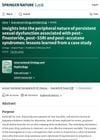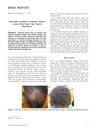Search
for
Sort by
Research
480-510 / 1000+ results
research Insights Into the Peripheral Nature of Persistent Sexual Dysfunction Associated With Post-Finasteride, Post-SSRI, and Post-Accutane Syndromes: Lessons Learned From a Case Study
Peripheral treatments showed some improvement in sexual dysfunction, but central symptoms remain challenging.

research Therapeutic Potential of Bimatoprost for the Treatment of Eyebrow Hypotrichosis
Bimatoprost is safe and effective for improving eyebrow hair.

research Successful Treatment of Pediatric Alopecia Areata of the Scalp Using Topical Bimatoprost
A 9-year-old girl with alopecia areata had successful hair regrowth using bimatoprost after other treatments failed.

research Causal Relationship Between Gut Microbiota and Androgenetic Alopecia: A Mendelian Randomization Study
Gut bacteria may affect hair loss risk.

research Selenium or No Selenium: That Is the Question in Tumor Patients - A New Controversy
There is no clear recommendation for using selenium in cancer patients; it may be beneficial to correct low selenium levels before treatment.

research The British Society for Rheumatology Guideline for the Management of Systemic Lupus Erythematosus in Adults
The guidelines suggest a detailed approach to diagnosing and treating lupus, with a focus on regular check-ups, personalized medicine, and a range of drug options for different cases.

research Advances in the Management of Alopecia Areata
New treatments for severe hair loss often fail, but some patients see hair regrowth with specific therapies, and treatment should be tailored to the individual's situation.

research Therapeutic Applications of Hair Follicle Transplantation Beyond Hair Restoration
Hair follicle transplantation can help treat wounds, sweating, odor, and skin conditions beyond just restoring hair.
research Topical Medication Instillation Techniques for Glaucoma
There is not enough evidence to know if different ways of putting in eye drops for glaucoma work better than others.

research Hormone Replacement Therapy for Women with Premature Ovarian Insufficiency: A Comprehensive Review
The review recommends hormone replacement therapy for women with premature ovarian insufficiency to manage symptoms and protect health, with specific approaches for different groups.

research Alopecia Areata: A Comprehensive Review of Pathogenesis and Management
New treatments for Alopecia Areata show promise but need to be more effective and affordable.
research Oral Contraceptives and Antiandrogens Most Effective for Hirsutism Pharmacotherapy
Oral contraceptives and antiandrogens are the best treatments for hirsutism.

research The Impact of Hair Care Practices and Attitudes Toward Hair Management on Exercise Habits in African American Women
Hair care practices and concerns about maintaining hairstyles can reduce how often African American women exercise.

research Elucidating Causal Relationships of Diet-Derived Circulating Antioxidants and the Risk of Non-Scarring Alopecia: A Mendelian Randomization Study
Higher levels of β-carotene and vitamin E may help prevent certain types of hair loss.

research Association Between Genetically Predicted Leukocyte Telomere Length and Non-Scarring Alopecia: A Two-Sample Mendelian Randomization Study
Shorter telomeres in white blood cells may increase the risk of a common type of hair loss.
research Cluster Headache: Acute and Prophylactic Therapy
Sumatriptan injections, high-flow oxygen, and verapamil effectively treat cluster headaches.

research Efficacy of Non-Surgical Treatments for Androgenetic Alopecia in Men and Women: A Systematic Review with Network Meta-Analyses and an Assessment of Evidence Quality
Minoxidil and finasteride work best for hair loss; more research needed.

research Novel Application of 1064-Nm Picosecond Nd:YAG Laser for Male Androgenetic Alopecia Treatment
A new laser treatment may help regrow hair in men with pattern baldness and has minimal side effects.

research Effectiveness of Ethinylestradiol/Chlormadinone Acetate in Treating Dermatological Conditions Related to High Androgen Levels
The oral contraceptive ethinylestradiol/chlormadinone acetate is effective in reducing acne and improving other skin conditions related to high androgen levels.

research Treatment of Hyperandrogenism in Polycystic Ovary Syndrome
Hormonal therapies are effective for managing hair and skin symptoms in women with PCOS.

research Post-Finasteride Syndrome: What to Tell Our Female Patients?
Finasteride for female hair loss has low side effects, more research needed.

research Baricitinib Safety for Events of Special Interest in Populations at Risk: Analysis from Randomised Trial Data Across Rheumatologic and Dermatologic Indications
Baricitinib, a drug for rheumatoid arthritis, atopic dermatitis, and alopecia areata, is generally safe with low risk of major side effects, even in patients with risk factors. It's also effective in promoting hair regrowth in alopecia areata patients.
research Genetic Predictors of Testosterone and Their Associations with Cardiovascular Disease and Risk Factors: A Mendelian Randomization Investigation
Testosterone is linked to cardiovascular risk factors and stroke, but its exact role is unclear.

research Causal Effects of Genetically Determined Metabolites on Androgenetic Alopecia: A Two-Sample Mendelian Randomization Analysis
Certain metabolites can either protect against or increase the risk of hair loss.

research How Routine Pharmacovigilance Failed to Identify Finasteride’s Persistent Sexual Side Effects
Finasteride, a hair loss drug, has unaddressed sexual side effects due to the manufacturer's inadequate safety measures and lack of additional studies.
research British Association of Dermatologists Guidelines on the Efficacy and Use of Acitretin in Dermatology
Acitretin is effective for severe skin conditions but has significant side effects and requires careful monitoring.

research Alopecia Areata: Treatment Options and Efficacy
Some treatments can help with a hair loss condition called alopecia areata, but none ensure lasting results; choices depend on the person, with JAK inhibitors showing promise for severe cases.

research Platelet-Rich Plasma as a Therapy for Androgenic Alopecia: A Systematic Review and Meta-Analysis
PRP treatment increases hair density and thickness in androgenetic alopecia by 79%.

research Concept of Tinea Capitis
Terbinafine is the most effective treatment for tinea capitis, a scalp infection often confused with other conditions.